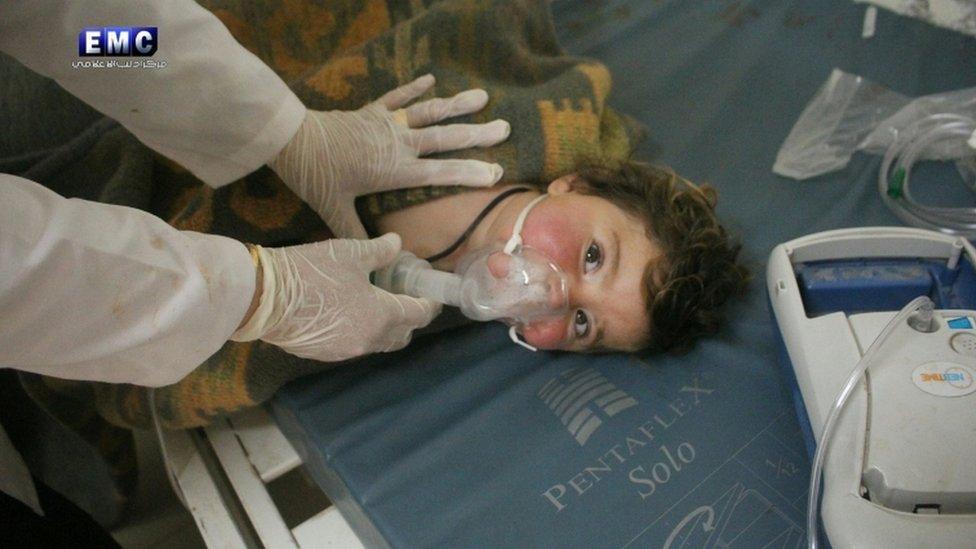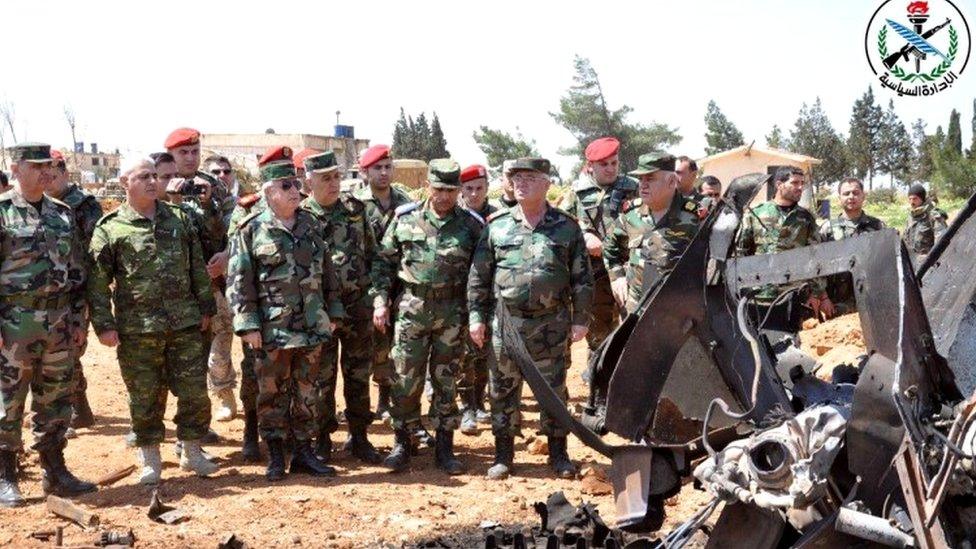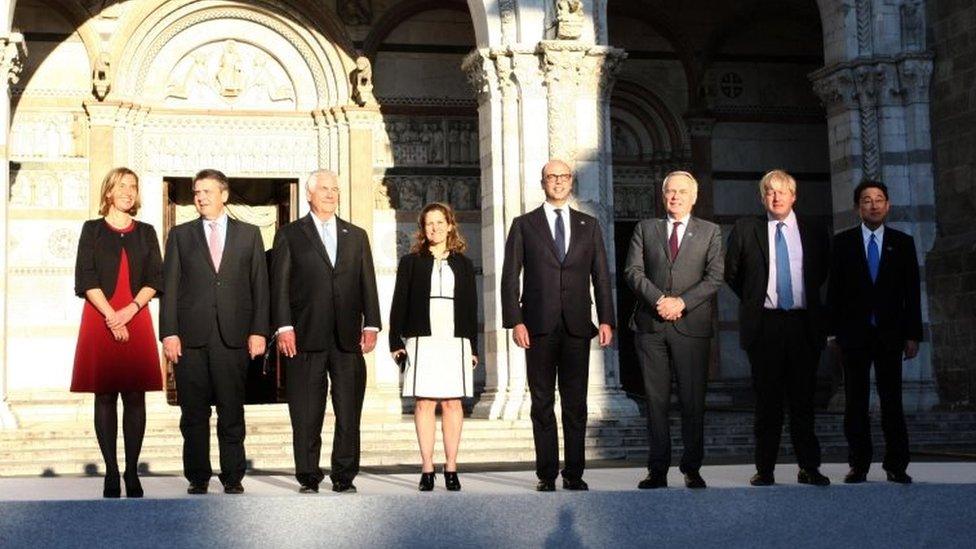Syria war: Russian officers 'could face sanctions'
- Published

The suspected chemical attack in Khan Sheikhoun last week left 89 people dead and many hurt
G7 foreign ministers will attempt to agree a common position on the Syrian conflict, before the US secretary of state flies to Russia to try to persuade it to abandon its Syrian ally.
Rex Tillerson will also meet officials from allied Middle Eastern countries before heading to Moscow.
The UK has suggested threatening tightly focused sanctions on Russian and Syrian military officers.
The moves follow the latest apparent use of chemical weapons in Syria.
Syria has denied it carried out a chemical attack on the rebel-held town of Khan Sheikhoun last week that left 89 people dead.
New details on chemical attack and retaliation

The Syrian military says the damage to the base was less than claimed by the US
Reports overnight quoted a senior US official as saying that the Russians knew of the chemical attack because a drone had been flying over a hospital in Khan Sheikhoun as victims sought help.
Hours later a jet bombed the hospital in what the US believed was an attempt to cover up the attack, the Associated Press agency said, external.
Meanwhile, US Defence Secretary James Mattis gave fresh details on the retaliatory strike against Syria's Shayrat airbase last Thursday.
He said the "measured response" by the US - which saw 59 Cruise missiles fired - had "resulted in the damage or destruction of fuel and ammunition sites, air defence capabilities and 20% of Syria's operational aircraft".
The Syrian military admits significant material damage but a Russian defence ministry spokesman said only six Syrian Air Force MiG-23s, plus a number of buildings, were destroyed and that only 23 of the missiles had reached Shayrat.
How can the G7 pressure Russia?

The US hopes the G7 can present a united front on Syria to help pressure Russia
Mr Tillerson broadened his consultations in Italy on Tuesday morning, with key regional allies including Saudi Arabia, Jordan, Qatar and Turkey joining the G7 governments meeting in Italy.
The US hope is that a UK proposal of new tightly focused sanctions could win approval - sanctions against named senior officers in both the Russian and Syrian armed forces accused of targeting civilians.
BBC diplomatic correspondent James Robbins says British officials recognise that the imposition of more general sanctions on Russia has previously been resisted by Italy and Germany, but they hope this narrower approach could get backing and provide Mr Tillerson with political ammunition to take to Moscow.
Downing Street says that when President Trump and the British Prime Minister Theresa May talked on Monday night, they agreed an opportunity existed to persuade Russia its alliance with Assad was no longer in its strategic interest.
Russia is already subject to a raft of sanctions imposed by the US and EU in response to the annexation of Crimea and the crisis in eastern Ukraine. President Obama expelled 35 Russian diplomats from the US in December 2016, in response to alleged hacking of the US election.
Will this have any effect on Putin?
Russian media turns on Trump
The fact that Rex Tillerson's visit to Moscow is happening at all is telling, says BBC Moscow correspondent Steve Rosenberg.
Russia reacted angrily to last week's US missile strike on Syria, condemning it as an "act of aggression". Yet Moscow is happy to host the US secretary of state. He'll meet his Russian counterpart Sergei Lavrov and a meeting with President Putin cannot be ruled out.
But experience shows that Moscow does not take well to threats or ultimatums. If America threatens Russia will additional sanctions, that is unlikely to force the Kremlin to change direction, our correspondent says.
If Mr Tillerson thinks he can weaken Moscow's support for President Assad, he may need to re-think. The Syrian President is Russia's key military ally in the Middle East. Russia has invested heavily - militarily, politically and financially - to keep him in power.
What are Syria and its allies saying?
Syria has denied using any chemical agents, and Russia says the US has failed to provide evidence Syria has chemical weapons.
Russia and Iran, President Assad's key military backers, are also threatening retaliation if there are any further American air strikes, saying the US attack had crossed "red lines".
"From now on we will respond with force to any aggressor or any breach of red lines from whoever it is and America knows our ability to respond well," said a statement from a joint command centre comprising the forces of President Assad's allies.
What is the US policy on Syria?
In recent days there have been mixed messages from the US on its priorities in Syria - and getting clarity on the administration's position was seen as a priority for the G7.
Mr Tillerson said on Sunday that there had been "no change to our military posture" in Syria following the US airbase strike and that Washington's "first priority" was to defeat so-called Islamic State (IS).
Those comments came a day after the US's ambassador to the United Nations, Nikki Haley spoke about the removal of President Assad, saying: "In no way do we see peace in that area with Assad as the head of the Syrian government."
There was further confusion on Monday. Mr Tillerson spoke in public about an interventionist approach, saying: "We rededicate ourselves to holding to account any and all who commit crimes against the innocents anywhere in the world."
"There is no moderate opposition waiting to take over" - former UK ambassador Peter Ford
Hours later, White House press secretary Sean Spicer suggested Mr Trump would act against Syria not just if it used chemical munitions.
"If you gas a baby, if you put a barrel bomb into innocent people, I think you will see a response from this president," Mr Spicer said in his daily briefing. The White House later said Mr Spicer had meant to refer to barrel bombs containing "industrial chemicals".